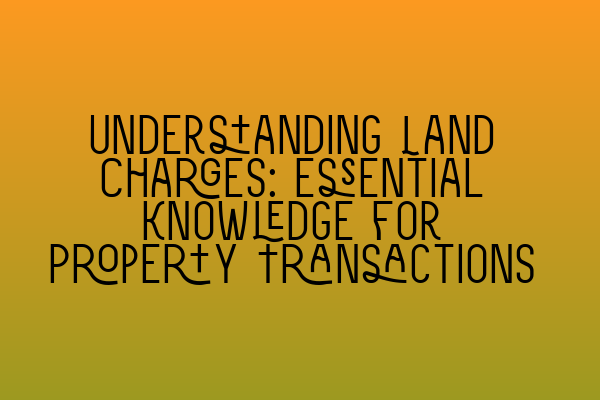Understanding Land Charges: Essential Knowledge for Property Transactions
Welcome to our blog post where we will be diving into the world of land charges and exploring their significance in property transactions. Whether you are a solicitor, property buyer, or simply someone looking to expand their knowledge, understanding land charges is essential to ensure a smooth and successful property transaction.
Before we delve into the details, let’s start with a brief definition. Land charges are legal interests or claims that are registered against a property, typically at the Land Charges Department of the Land Registry. These charges act as a notice to any potential buyers or interested parties about certain obligations or restrictions associated with the property.
1. Types of Land Charges:
There are various types of land charges, each serving a specific purpose and providing crucial information about the property. Some common examples include:
a. Restrictive Covenants:
These are limitations or conditions imposed on the use or development of the property. Restrictive covenants can restrict activities such as building extensions, altering the property, or using it for specific purposes. It is important to carefully review these restrictions before proceeding with any property transaction.
b. Equitable Interests:
Equitable interests refer to any rights or interests relating to the property that are not yet fully recognized at law. This could include beneficial rights or interests arising from agreements, trusts, or proprietary estoppel. Understanding equitable interests is crucial to mitigate any potential disputes or claims in the future.
c. Mortgages:
One of the most common land charges is a mortgage. A mortgage is a loan secured against the property, giving the lender the right to repossess and sell the property if the borrower fails to make repayments. When dealing with a property that has an existing mortgage, it is important to ascertain the outstanding balance and any specific terms associated with the mortgage.
2. Registering Land Charges:
Land charges must be registered to ensure that they are enforceable and well-documented. This process involves submitting the relevant details and supporting documents to the Land Charges Department of the Land Registry. Once registered, land charges become binding on any future purchasers or owners of the property.
It is crucial to conduct thorough searches to identify any registered land charges when dealing with property transactions. This can be done by obtaining an official search from the Land Registry or a local authority search. These searches will reveal any charges, restrictions, or obligations associated with the property.
3. Importance of Understanding Land Charges:
Understanding land charges is vital for both buyers and sellers in property transactions. For buyers, it helps identify any potential issues or restrictions that may affect their intended use of the property. Sellers, on the other hand, need to be aware of any charges on their property to ensure compliance and avoid any disputes or legal complications.
It is also worth noting that land charges can have significant implications for lenders. Lenders will assess the registered charges on a property to determine its value and their level of security in the event of default. Failing to consider land charges in mortgage applications can lead to delays or even rejection.
In conclusion, having a clear understanding of land charges is crucial when dealing with property transactions. By being aware of the different types of land charges, registering obligations properly, and conducting thorough searches, all parties involved can make informed decisions and avoid potential complications.
For further reading on related topics, we recommend checking out the following articles:
– SQE Contract Law: Analyzing Landmark Cases and Influential Judicial Decisions
– Understanding Contractual Capacity: Rights and Limitations
– Interactive SQE Mock Tests for Contract Law: Test Your Knowledge
– Join Our SQE Contract Law Webinars: Expert Insights and Guidance
– SQE Prep: Mastering the Essentials of Contract Law
We hope this blog post has provided you with valuable insights into land charges and their significance in property transactions. If you have any further questions or require legal assistance, do not hesitate to reach out to SQE Property Law & Land Law. We are here to guide you through the complexities of property law and help you achieve a successful transaction.
